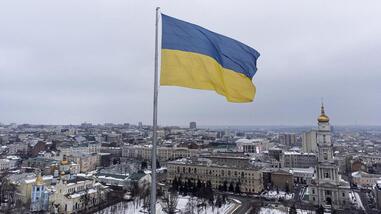 This evening I was supposed to be attending a candlelit vigil for the people of Ukraine and giving a brief personal testimony. Unfortunately Covid had other ideas, so my words will now be spoken by someone else. It won’t be so personal, but the sentiment is the same. Here is what I planned to say: My grandmother came from the village of Pavoloch, about 60 miles southwest of Kyiv. The area has witnessed untold suffering over the last century, and is suffering once again today. The nearest town to Pavoloch is Bila Tserkva, which has been hit repeatedly by Russian missiles fired towards Kyiv from the Black Sea. Photographs show buildings flattened, the ground strewn with burning rubble. You may have watched the video of a Ukrainian musician playing her piano one last time in a bombed-out apartment before fleeing. That was in Bila Tserkva. A hundred years ago, this area was a battleground of a different kind, as the Russian Civil War raged across Ukraine. Numerous armies – ‘banda’ as Grandma called them – criss-crossed the land – Communists, Nationalists, Anarchists, anti-Bolsheviks, peasant militias. My family was Jewish and all of these banda were anti-Semitic to a greater or lesser degree. Around 100,000 Jews are estimated to have been murdered during the pogroms that accompanied the civil war, on top of the thousands killed or injured during previous waves of pogroms in the same part of the world. As well as violence during the civil war, there was hunger. Food had become scarce during the long years of World War l, and inflation soared, making what little there was unaffordable. On top of this, the Bolsheviks requisitioned grain – including from my great-great grandfather, a grain trader – to feed the workers in the towns. Not only did they requisition grain, but also seed, leaving the peasants with nothing to sow crops for the following year. The countryside was left to starve. Grandma was about 17 years old at the start of the civil war, and an orphan. But she was part of a large household, living with her grandparents, siblings and cousins. Grandma took it upon herself to become the family breadwinner, undertaking terrifying, illegal journeys by train to markets across the region to buy, sell and barter what she could to keep her family alive. Eventually she became a black-market gold dealer, taking gold hundreds of miles across the country to Kharkiv and bringing back hard currency in return. If caught, she would have been shot. Grandma was a tiny, delicate woman, about five feet tall. She spent three years jumping on and off trains with her contraband goods, often staying away from home overnight. She hated every moment of it. Eventually, in 1924, she could take it no more and made up her mind to leave. She fled to Canada, travelling alone, and with nothing. There she found a job and scrimped, saved, and borrowed to raise enough money to bring the rest of her family over to join her the following year. One member of her household – her cousin Baya – chose to stay behind. She was a student in Kyiv and engaged to be married. Then, in the summer of 1941, by which time Baya was working as an engineer, the Germans invaded Soviet Ukraine. Baya was one of a group of Jews herded aboard a boat on the River Dnieper, which cuts through the centre of Kyiv. The boat was set alight. There were no survivors. In Pavoloch itself, more than 1,300 Jews were shot in September 1941. Later, in November 1943, when no Jews remained, dozens of men and women – enemies of the Third Reich – were locked inside the synagogue and it was set alight. One of the biggest massacres of the Holocaust took place on the outskirts of Kyiv in September 1941, when Nazi death squads and their Ukrainian collaborators shot more than 33,000 Jews in two days at the ravine of Babyn Yar. On 1 March 2022, a Russian missile aiming for a nearby TV tower hit the Babyn Yar Holocaust Memorial site, a strike that killed five people. For the elderly people of Ukraine who remember the events of 1941, history is repeating itself. To live through such a brutal invasion not once but twice is a tragedy beyond belief.
0 Comments
Leave a Reply. |
Keeping stories aliveThis blog aims to discuss historical events relating to the Jewish communities of Ukraine, and of Eastern Europe more widely. As a storyteller, I hope to keep alive stories of the past and remember those who told or experienced them. Like so many others, I am deeply troubled by the war in Ukraine and for the foreseeable future, most articles published here will focus on the war, with an emphasis on parallels with other tumultuous periods in Ukraine's tragic history. Archives
March 2024
Categories
All
|
 RSS Feed
RSS Feed
